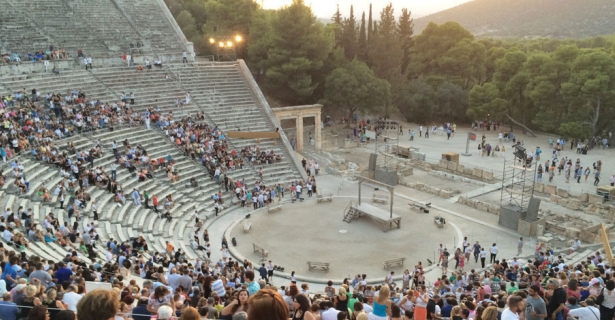From my upper-tier, center-right seat within the historic Epidaurus Ancient Theatre, I watched as the crowd slowly emerged from beneath the fairytale-looking panoply of trees to fill the seats surrounding me. Collectively, we had arrived to this UNESCO World Heritage Site – initially constructed in the 4th century BCE – to enjoy a performance of Antigone, a Greek tragedy written by Sophocles around 442 BCE.
As the acoustics propelled the actors’ voices to our respective ears, we the audience followed an act of timeless themes. The story of Antigone juxtaposes the characters of Antigone and Creon, who proclaim conflicting notions of duty: one to the state, and the other to gods and family. Antigone feels compelled to give her recently-deceased brother a proper burial, despite the decree of Creon, the new leader of Thebes, to dishonor him by leaving his body unburied. The tragedy proceeds from there, with Creon and his positivist law surviving, yet broken by the fatal outcome that befalls his wife and son as a consequence.
Our excursion to the Epidaurus Ancient Theatre to see Antigone is a part of the Olympia Summer Academy program in Nafplio, Greece, where I am studying political violence and conflict. The course has helped to reinforce the importance of interrogating straightforward explanations for the causes and conduct of conflict, appreciating instead or also the diverse, complex and micro foundations that often propel actors to make the decisions that they do. As Antigone exemplifies, conflict and its resulting violence may involve appeals to broader themes such as man-made versus natural law, but such universalisms may nevertheless belie a more nuanced account of conflict that recognizes the ways that intimate relationships have their own overlapping, explanatory power.
Situated within the tremendous history of Greek civilization, where amphitheaters and dramatic productions persist across millennia, I find myself humbled by the endurance of humanity and its relational struggles over time, yet simultaneously intrigued by the dynamism of its evolution.

